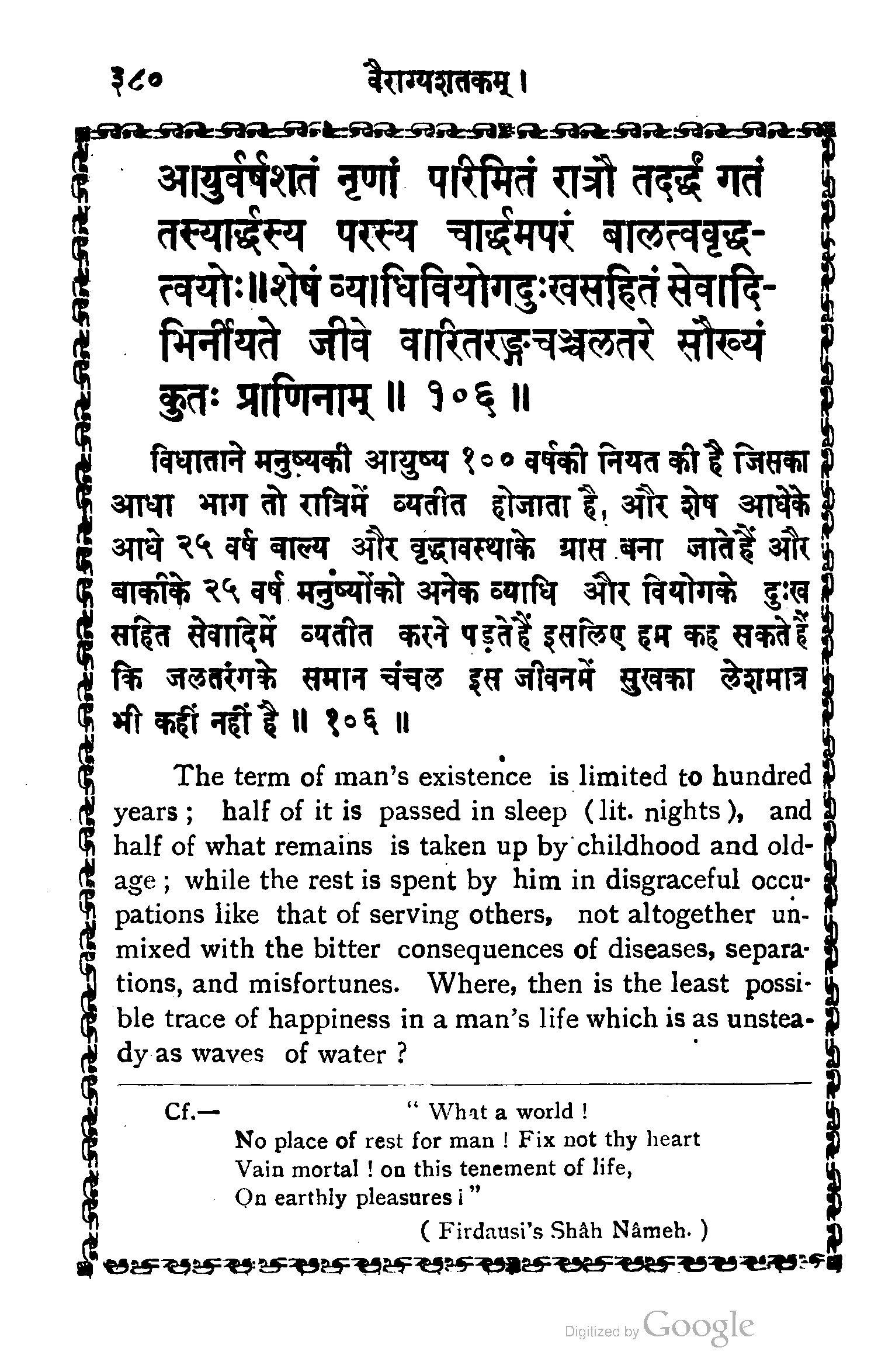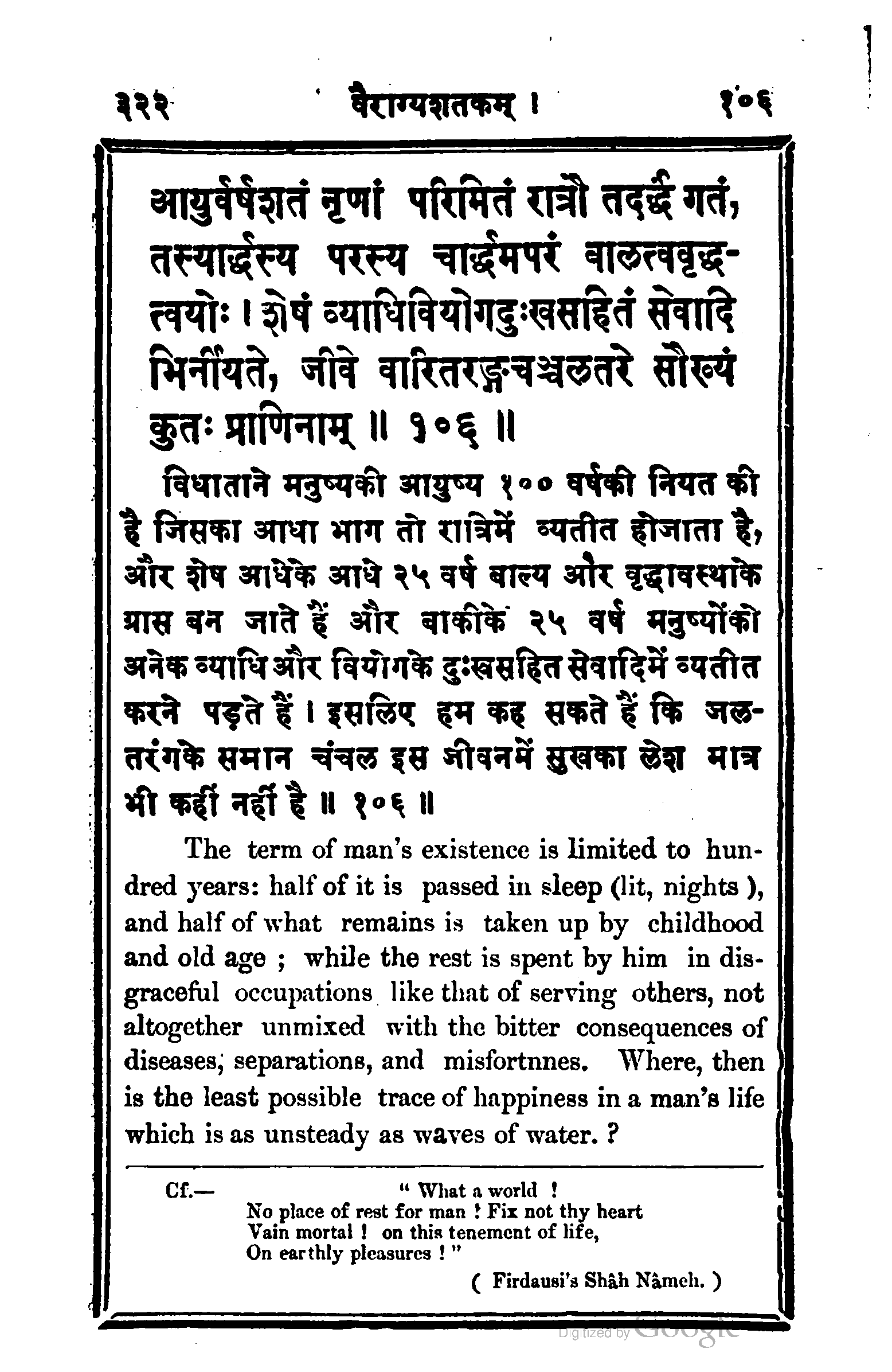Brough
Tawney
More
Mādhavānanda
Telang
verse

Text (not proofread)
आयुर्वेर्षशतं नृणां परिमितं रात्री तदर्धं गतं
तस्पार्धस्य परस्प चार्धमपरं बालववृद्धत्वयोः ।
दोषं व्याधिषियोगदुःखसहितं सेवादिभिर्नीयते
जीवे वारितरङ्ग चञ्चलतरे सौख्यं कुतः प्राणिनाम् ॥ १०७ ॥
footnote

Text (not proofread)
CVII . ( 6 ) ०३० ; ° ल्य ° . M. ( c ) ० योग ; ° देश . M. सेवा ० ; शा .
P.R. ( d ) चञ्चलतरे ; बुहुदसमे . A. Bo.n.
endnote

Text (not proofread)
St. CVII . - On the second line Râmarshi says de ³r TRADE
र्षाणां परस्य अर्धस्य पञ्चविंशतिवर्षांणामित्यर्थः अर्वे सार्धद्वादशवर्षाणि पुनः सार्धंद्वादशवर्षा
णीत्यर्थः • • • • शेषंमुर्वरितमायुः पञ्चविंशतिपरिमितवर्षमित्यर्थः . This is not quite
clear . I suggest the following : तस्य ( भायुषः ) परस्य ( रात्रिगतार्धेतरस्य )
अस्य अपरमर्धम् The commentary says ततोनन्तरं तस्य पञ्चाशत अ ( sic )
धंस्य कदाचिदपि अधिकममपि बाललवृद्धवयोगतम् . According to our inter
pretation would be used only to distinguish it from the
first but if so it might have been dispensed with . On
बाळख and वृद्धव Rāmarshi says बाल्यमविक्रेत्यर्थः तथा वृद्धत्वं कार्यासक्त्या
. : = the pains of illness and separation.
S'árdúlavikrídita .
Kosambi
verse

Text (not proofread)
आयुर्वर्षशतं नृणां परिमितं रात्रौ तदर्धं गतं
तस्यार्धस्य परस्य चार्धमपरं बालत्ववृद्धत्वयोः ।
शेषं व्याधिवियोगदुःखसहितं सेवादिभिर्नीयते
जीवे वारितरङ्ग चञ्चलतरे सौख्यं कुतः प्राणिनाम् ॥ २०० ॥
footnote

Text (not proofread)
200 Om . in NS1 . $ 108 ( 7 ) extra in BORI 381 of 1884-87 . – “ ) C राज्या
ततोधं हृतं ; Eot रात्री तदधं कृतं ; I रात्रौ तदर्धीकृतं – 6 ) F2 तस्याधं च ; G1 तस्याप्यर्ध .
E20.3.4.50 It कदाचिद् ; Y3 पर : स ( for परस्य ) . A F3 शेषमपरं ; E20 . 3. 4. 50 It अर्धमधिकं ;
X चार्धमधिकं . A Eat Ic J12 W2-4 Ga ( orig . ) बाल्यरधवृद्धत्वयोः ; ; Est It वृद्धत्वबाल्ये
गतं [ बालत्व is grammatically correct ; but original may have been बाल्यत्व- ] . - )
Eot . ot -विदेश ( for -वियोग- ) . A -दुःखसहितैः ; B1 - भोगसहितं ; B2 रोगसहितं ; C
दुःखकल हैर ; E -शोकसहितं ; H10 . 80 दुःखबहुलं ; I रोगजनतैर् . B कामादिभिर्नीयते ; C भूपालसे
वारसैः ; Hit . 2 क्लेशादिभिनयते ; I दुःखादिभिनयते . – 4 ) Eot F4 जीवेद्वारि - . CF5 X
-बुहुदसमे ; F + बुद्बुदसमं ; H1c . 80 बुद्बुदचले ; W1 चंचलतले ; Ys भंगचपले ( for- चञ्चलतरे ) .
E + t धर्म : ( for सौख्यं ) .
BIS . 996 ( 378 ) Bhartr . ed . Bohl . 3.50 . Hasb . 47. Galan 46 lith ed . IT . 95 .
Subhāsh . 82 ; SRB . p . 373 180 ; SRK , p . 94 , 9 ( Bh . ) ; SA . 38 , 6 ; SS . 50. 12 ;
SSV . 125 ; SMY . 30.8 .

